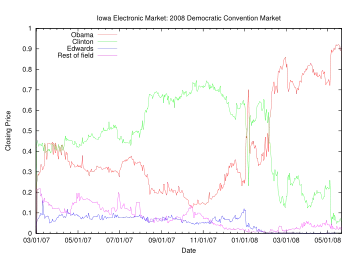
The Iowa Electronic Markets (IEM) are a group of real-money prediction markets/futures markets operated by the University of Iowa Tippie College of Business. Unlike normal futures markets, the IEM is not-for-profit; the markets are run for educational and research purposes.
Overview
The IEM allows traders to buy and sell contracts based on, among other things, political election results and economic indicators. Some markets are only available to academic traders. The IEM also trades futures based on financial markets, such as whether the Fed Funds rate will be raised at the following meeting.
The IEM has often been used to predict the results of political elections with a greater accuracy than traditional polls.[1][2][3][4]
A precursor to the IEM was the Iowa Political Stock Market (IPSM), invented by George Neumann, and developed by Robert E. Forsythe, Forrest Nelson, and George Neumann.
Rules and limits
The IEM is neither regulated by the U.S. Commodity Futures Trading Commission (CFTC) nor by any other agency due to its academic focus and the small sums that are involved. Indeed, the IEM has received two no-action letters that extend no‑action relief. A speculator may put at risk in the IEM only between $5 and $500. In contrast, other future markets like Nadex are regulated by the CFTC and allow speculators to take on or financially offset significant amounts of risk regarding economic events or the prices of commodities.
See also
References
- ↑ IEM Accuracy Compared to Polls Archived 2012-07-07 at the Wayback Machine Accessed: 10/26/2012
- ↑ Surowiecki, James. The Wisdom of Crowds: How the Many Are Smarter than the Few and How Collective Wisdom Shapes Business, Economies, Societies and Nations. Doubleday, 2004. p. 19
- ↑ "Previous Market Performance". Archived from the original on 2016-10-01. Retrieved 2016-09-29.
- ↑ IEM and Poll Accuracy, 2008 Presidential Race Archived 2012-11-04 at the Wayback Machine Accessed: 10/26/2012
Further reading
- Surowiecki, James (2004). The Wisdom of Crowds: Why the Many Are Smarter Than the Few and How Collective Wisdom Shapes Business, Economies, Societies and Nations Little, Brown ISBN 0-316-86173-1
- Thompson, Donald N. (2012). Oracles: How Prediction Markets Turn Employees into Visionaries Harvard Business Review Press ISBN 978-1-4221-8317-5
External links
- The Iowa Electronic Markets website
- Graphs for 2008 US Presidential Election Markets
- A Market for Playing the 2 Candidates, (about the IPSM) The New York Times, 1992
- The "Election Futures Market": More Accurate Than Polls?, Businessweek, 1996
- Porkbellies and Politics, TheStreet.com, 2000
- Bookies seen outbidding election polls: Betting sites better at predicting winner, economists claim, MSNBC, 2004
- The Iowa Electronic Markets are still going for Bush, Salon.com, 2004
- Iowa 'futures' show Republican weakness, CNN, 2006
- PollyVote - Forecasting the U.S. Presidential Election